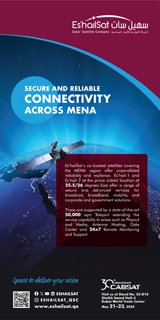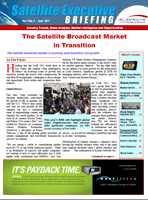From New Digital Oil Fields to the Seaborne Broadband Domain
by Martin Jarrold
Aberdeen, Scotland, June 1, 2011--The GVF Oil & Gas Communications Series has recently concluded its 12th conference which took place in Aberdeen, Scotland, over 17th & 18th May.For the second year in succession, theOil & Gas Communications Europe Conference extended its Digital Applications & Communications Dynamics focus beyond the territory of the mature hydrocarbon-bearing sectors of the North Sea, into the far northern latitudes of the Arctic Ocean region.
Widely acclaimed as being as successful as the previous event in the Series, which was held just four weeks before in Rio de Janeiro, the conference attracted the participation of a total of 43 organizations – Access Partnership; Advantech Wireless; AnaCom Inc; Arqiva; Avanti Communications; Baker Hughes Inc; Bibby Offshore; British Petroleum; Broadband Technology 2000; C-COM Satellite Systems; Centrica; Cobham; Codan; Diamond Offshore; Ensco; Eutelsat; Gilat Satellite Networks;Harris CapRock; Hermes Datacomms; Hughes Europe; Integral Systems Europe; Intelsat; Internet for Business; Kongsberg Oil & Gas Technologies Limited; Marathon Oil; Nexen; Northern Sky Research (NSR); Orange Business Services; RigNet; Romantis Communications; Sematron; SES World Skies; Shell E&P Europe; Shell Information Technology International; sIRG (Satellite Interference Reduction Group); SpeedCast; Stena Drilling; Talisman Energy; TecOffshore; Telenor Satellite Broadcasting; VeVoe; ViaSat; and, YR20 – and approximately 100 attendees.
Readers of this column who were unable to attend the event can gain access to the conference presentations (in PDF format) from both the GVF and EMP websites. From the GVF homepage at http://www.gvf.org/ you can follow the link under ‘Download Event Presentations’, and the EMP web pages dedicated to the event (www.uk-emp.co.uk/4th.O&G.Europe.2011/) provide a similar download facility.
The next conferences in the GVF Oil & Gas Communications Series are the 13th, to take place in November this year in Kuala Lumpur, Malaysia, and the 14th which is tentatively scheduled for Q1 2012, to take place in Luanda, Angola. The Angola initiative continues the pattern already established with the Oil & Gas Communications Brazil 2011 conference, that of taking the GVF Oil & Gas Communications Series to the newer parts and emerging regions of the global oil and gas patch.
Prior to all of this the GVF-EMP Conference Partnership has turned its focus to the 5th conference in the GVF Broadband Maritime Series, taking place in London on 28th & 29th June 2011.‘Broadband Maritime Europe 2011: Expanding Communications – Networking Solutions to the Arctic Horizon’is to be held in association with Inmarsat, Eutelsat, Telenor, and Comtech EF Data, and will continue the 2010 conference dialogue which was described as the most unique and original program yet delivered on ICT connectivity for the High Seas, Inshore, and the High Northern Latitudes.
The conference will include the support of, together with program contributions from representatives of, NSR as Conference Content Partner. This partnership has now been extended to cover the Broadband Maritime Series, following the successful collaboration between GVF-EMP and NSR for the Oil & Gas Conference Series. Additionally, the conference is also being held in coordination with the GVF Maritime SatCom Forum.
Whilst maintaining the already defined broad focus on the key elements of maritime satellite communications that are common to all ocean regions and seaways – covering such market segments as cargo (container vessels, bulk carriers, tankers, etc), passenger (cruise liners, passenger and vehicle ferries, etc), fishing (trawler fleets, factory ships, etc), leisure (yachts, etc), oil & gas (semi-submersible rigs, FPSOs, etc), exploration (government, scientific, etc), and naval/coast guard activity (sea lanes security, smuggling/piracy interdiction, etc) – the 2011 conference will introduce regionally-unique topics and themes, such as the opening to year-round navigation of arctic seaways that are affected by climate change and the progressive retreat of the melting north-polar ice shelf and pack sea ice.
As global climate change warms the environment of the Arctic latitudes, and as the Arctic Ocean is progressively opening-up to year-round maritime navigation – through, for example, the North Western and North Eastern Passages – the satellite and wireless communications industry must begin to gear-up for, and respond with a clear commercial service offering for, the new business opportunities that will arise from ocean navigation routing that will reduce by thousands of miles – and thus significantly cut the costs of – the sea routes that take primary, industrial, and consumer goods from Asia to northern hemisphere markets.
The conference investigation of the new communications market opportunities relating to Arctic maritime routing and navigation will, in part, be premised on the presentation of the preliminary findings, as established to-date, of the European Space Agency (ESA) Satellite Telecommunication Division research study ‘ArctiCom: Future Arctic Communications Requirements’. This research study, organized from ESA-ESTEC – the European Space & Technology Centre of ESA – and begun in November 2010, is currently work-in-progress. The study is originally based on Arctic Marine Shipping Assessments (AMSA), and Arctic Council documents examining the case for the need for reliable satellite communications (and associated satellite navigation technologies) in the Arctic, and brings together the engagement of a SINTEF, TeleSat, Telenor, MARINTEK, and EuroConsult consortium, and of other stakeholders including the Arctic Council, the International Maritime Organization (IMO), the European Commission Directorate-General for Maritime Affairs and Fisheries (EC DG MARE), maritime VSAT providers, shipping operators, etc, and with review from the Norwegian and Canadian Space Agencies, maritime users, and various Russian experts.
Overall, the London conference will feature a dialogue on the following themes:
- Maritime Satellite Communications: Demand & Supply Shifts across the Sector
- Segmenting Europe’s Maritime Broadband Satellite Communications Requirement
- Spectrum Shift: Satellite Operators, Network Providers & Deployment of New Global Broadband
- The Maritime Communications Platform: Ocean-Going ICT & the Seaborne Enterprise
- Communications Networking for Efficient Fleet Management
- Satellite Networking & Expanding Maritime Communications for an Arctic Horizon
- Regulatory Open Forum: Communications Inshore & on the High Seas
- Satellite ICT on the Bridge: Data Capture, Analysis & Reporting Systems
- Maritime Satcoms Terminal Equipment: Supply-side Challenges & Developments
- GVF Installer Training Program for the Stabilized Antenna Market
- The Maritime Communications Spectrum Environment: Interference Challenges & Challenging Interference
- Safety and Distress Maritime Communications Systems & the Satellite Broadband Environment
- Weather Data Streams: Real-time Access & Dissemination of Local, Regional & Global Information
- The Multi-Technology Challenge for Satellite Communications at Sea
- Naval High-Seas Networking and Merchant Communications Solutions: A Systems Resilience Profile
- Communications Applications in Home & Foreign Waters Naval Force Deployments
- The Mobile Communications Foundation to “Non-Conflict Emergency” Deployments & the Dynamics of Integrating Communications Networking for Geographically Remote Applications
It is noteworthy that, as an example of the inter-related nature of many of these otherwise seemingly discrete session themes, the program will feature discussion of maritime earth station (ESV) equipment installations, and the closely associated issues that pertain to signal interference mitigation in the maritime communications spectrum environment.
As in previous years the conference organizers at GVF and EMP have announced that registration for the GVF Broadband Maritime Europe conference is complimentary and free-of-charge for representatives of the maritime industry, including Shipping Companies, Ship Management Companies,Ship Owners & Operators Container Lines, Cruise Lines, Ferry Operators, Rig Owners & Operators, and Port Authorities. Further information on this and all other aspects of GVF-EMP conferences may be obtained from me at martin.jarrold@gvf.organd from Paul Stahl at paul.stahl@uk-emp.co.uk.
The following website provides details on the London Broadband Maritime Europe 2011 Conference: www.uk-emp.co.uk/5th.BMEu.Ldn.2011/
-------------------------------
 Martin Jarrold is Chief of International Program Development, GVF. He can be reached at martin.jarrold@gvf.org
Martin Jarrold is Chief of International Program Development, GVF. He can be reached at martin.jarrold@gvf.org




